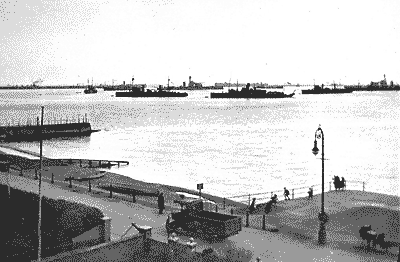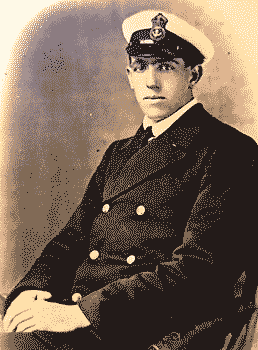|
The
"We Remember" Booklet 2006
DOVER
HARBOUR IN THE GREAT WAR
 Dover
played a vital role throughout the First World War. 101,872
special trains carried over 12 million soldiers and supplies to
cross the Channel and converted ferries brought back one million
wounded. There were up to 20 hospital trains a day. The Dover
Patrol used the harbour as a base to protect the Channel
(pictured below). A measure of their achievement is that of the
125,000 merchant ships that used the Strait between 1914-18 only
73 were lost. 2094 troopship and 3875 hospital ship movements
were also protected. 13 Victoria Crosses were awarded, but 2,000
men were lost. Dover
played a vital role throughout the First World War. 101,872
special trains carried over 12 million soldiers and supplies to
cross the Channel and converted ferries brought back one million
wounded. There were up to 20 hospital trains a day. The Dover
Patrol used the harbour as a base to protect the Channel
(pictured below). A measure of their achievement is that of the
125,000 merchant ships that used the Strait between 1914-18 only
73 were lost. 2094 troopship and 3875 hospital ship movements
were also protected. 13 Victoria Crosses were awarded, but 2,000
men were lost.
On the outbreak of war the Expeditionary Force
crossed the Channel including the three infantry regiments based
at Dover as did the Royal Marines who marched from Deal. A fleet
of buses and lorries arrived for use in Flanders. Members of the
Belgian Royal Family arrived at Dover with the Belgian gold
reserves and during October 1914 15,000 refugees came.
The defences of the great naval harbour,
completed just five years before, were improved with booms at
the eastern entrance and two blockships at the western entrance.
From Dec-ember 1914 the harbour was under frequent attack. Early
in 1915 the anti-U-boat offensive of laying mined nets from one
side of the Channel resulted in fewer casualties.
 Following
the famous Zeebrugge Raid on 23 April 1918, Dover welcomed home
the badly-battered HMS Vindictive where she received the homage
of every ship in port and cheers from the crowd on shore. 156
died and 400 were wounded in the heroic action, which is
commemorated every St. George's Day by the Mayor ringing the Zeebrugge bell outside Dover Town Hall. Following
the famous Zeebrugge Raid on 23 April 1918, Dover welcomed home
the badly-battered HMS Vindictive where she received the homage
of every ship in port and cheers from the crowd on shore. 156
died and 400 were wounded in the heroic action, which is
commemorated every St. George's Day by the Mayor ringing the Zeebrugge bell outside Dover Town Hall.
After the
Armistice in November 1918, prisoners of war soon started to
arrive home. The first 800 were given a great welcome by crowds
and were greeted by the Prince of Wales. The whole of Dover
turned out the week before Christmas 1918 to greet Field Marshal
Sir Douglas Haig and his commanders when they returned to
England with an escort of destroyers and aeroplanes and then
drove along the crowd-lined seafront.
On 10 November
1920, the body of one unidentified soldier was brought to Dover
escorted by six destroyers on its way to Westminster Abbey where
it was laid to rest, representing the hundreds of thousands of
British troops with no known grave or identities unknown.
Derek Leach OBE, local historian and author
Pictures:
Dover patrol in Dover Harbour,
courtesy Dover Museum
below:
HMS Glatton, wreckage in Dover Harbour, courtesy Dover Museum
*
 *On 16 September 1918 there was a big explosion on HMS Glatton
in the
harbour
and many were killed or injured. There was a big threat to other
ships, the harbour walls, and the town itself from the big store
of ammunition on board. The decision was taken to torpedo the
vessel with men still trapped on board. More than three-quarters
of the complement were killed or injured, but this terrible loss
of life saved the town and harbour from serious damage. *On 16 September 1918 there was a big explosion on HMS Glatton
in the
harbour
and many were killed or injured. There was a big threat to other
ships, the harbour walls, and the town itself from the big store
of ammunition on board. The decision was taken to torpedo the
vessel with men still trapped on board. More than three-quarters
of the complement were killed or injured, but this terrible loss
of life saved the town and harbour from serious damage.
One of those who so sadly lost his life was Thomas Brebner
Mackie, son of James and Jessie Mackie, from 38 Gratton Place,
Fraserburgh, Aberdeenshire. He was an Engine Room Artificer, 4th
Class, and was 22
 when
he was killed. The bodies from the Glatton were sadly not
retrieved until 1930, and are now buried at Gillingham
(Woodlands) Cemetery, Kent. Thomas Mackie is named in the Dover
Patrol Book of Remembrance
here when
he was killed. The bodies from the Glatton were sadly not
retrieved until 1930, and are now buried at Gillingham
(Woodlands) Cemetery, Kent. Thomas Mackie is named in the Dover
Patrol Book of Remembrance
here
Right: Thomas Mackie, with thanks to Lawrence
Mackie
See also
Captain
William Pearce's account of the Glatton
*
Derek Leach has written a number of books about Dover. More
information may be found on his
website
(www.dover-books.co.uk)
|